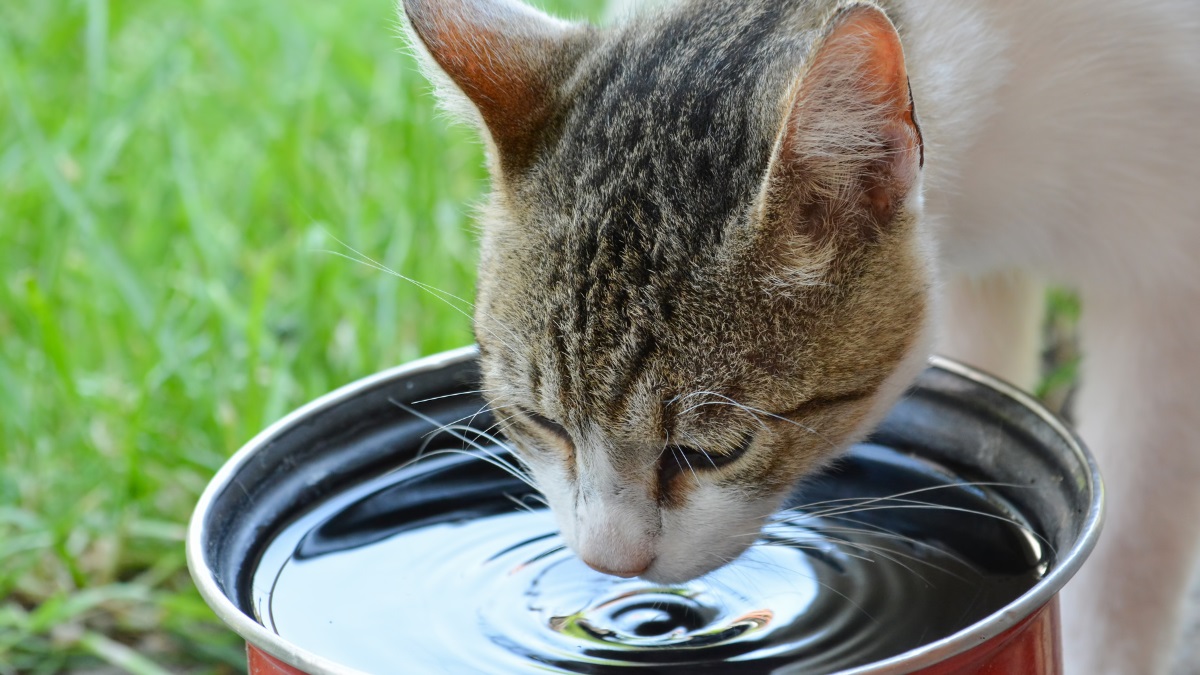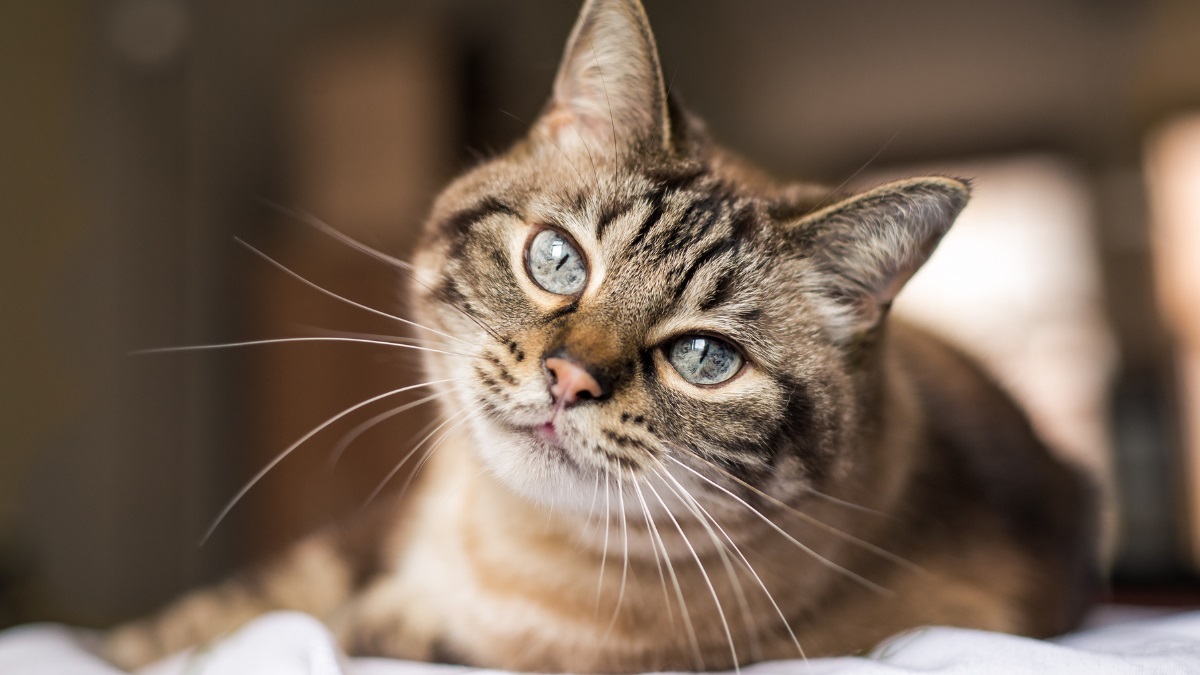Do you need help?

While summer is a great time for cats to enjoy the outdoors, it also brings some seasonal hazards. From heatstroke to hidden poisons, here are 7 key risks every cat owner should know about to help keep their pet safe in the warmer months.
Traffic & hiding hazards
Warm tarmac and shaded spaces make cars a tempting place for cats to rest, especially under parked vehicles or even inside wheel arches. Unfortunately, this can lead to tragic accidents.
Summer also sees more people out and about, which means increased traffic. Cats are naturally curious and may roam further during the warmer months, putting them at greater risk of road traffic accidents, especially at dawn and dusk when visibility is low.
How to help keep your cat safe:
- Always check under and around your car before starting the engine.
- Tap the bonnet to wake a sleeping cat before driving off.
- Keep cats indoors overnight when traffic accidents are more common.
- Consider fitting a quick-release reflective collar to increase visibility.
- If possible, create shaded, comfortable resting spots in your garden to encourage your cat to stay closer to home.

Heatstroke and overheating
Cats may love sunbathing, but they aren’t immune to the dangers of extreme heat. Enclosed spaces like greenhouses, conservatories, and parked cars can become dangerously hot in a matter of minutes, even with the windows open. Unlike dogs, cats are less obvious about showing discomfort, so heatstroke can happen quickly.
High-risk situations include:
- Being accidentally shut in a shed, greenhouse, or conservatory
- Travelling in a pet carrier on a hot day
- Sunbathing for extended periods without access to shade or water
Signs of heatstroke in cats may include:
- Rapid breathing or panting
- Drooling or excessive salivation
- Lethargy or weakness
- Vomiting or collapse
- Bright red tongue or gums
If you suspect heatstroke:
- Move your cat to a cool, shaded area immediately.
- Use cool (not cold) water or damp towels to gently lower their body temperature, focus on the paws, belly, and armpits.
- Offer water to drink, but don’t force it.
- Seek veterinary help urgently. Heatstroke is a life-threatening emergency.
Always ensure your cat has access to shade, fresh water, and ventilation, whether indoors or out. A cool tile floor or a fan in a quiet room can make a big difference.
Sunburn
Light-coloured and thin-coated cats are especially vulnerable to sunburn, particularly on exposed areas like the ears, nose, and around the eyes. Repeated sun exposure without protection can cause painful burns and increase the risk of developing skin cancer.
How to protect your cat:
- Use a pet-safe sunscreen specifically formulated for cats on sensitive areas before they go outside. Do not use human sunscreen as it can be toxic.
- Provide plenty of shaded spots outdoors – such as under trees, awnings, or a shaded cat shelter.
Parasites, bites and stings
Warm weather means an increase in parasites like fleas and ticks, which can cause discomfort, skin irritation, and even transmit diseases. Summer also brings more social interactions and territorial fights, resulting in more cat bites and scratches. Insect stings from bees or wasps can trigger allergic reactions or swelling.
What to watch for:
- Fleas or flea dirt in your cat’s coat, excessive scratching, or skin redness.
- Ticks attached to the skin, particularly around the head, neck, and ears.
- Swelling, redness, or pain from insect stings, and any signs of breathing difficulty or allergic reaction.
- Fresh bite wounds or abscesses after outdoor fights, which may become infected.
Poison risks
Summer increases the chances your cat might encounter poisonous substances accidentally. Many common household or garden products can be lethal if ingested.
Common poisons to watch out for:
- Permethrin, found in some dog flea and tick treatments, is extremely toxic to cats – never use dog products on cats.
- Antifreeze and engine coolant contain ethylene glycol, which tastes sweet but is deadly even in tiny amounts.
- Slug and snail pellets can cause severe poisoning within an hour of being swallowed. Avoid any products containing a substance called metaldehyde and scatter any pellets you do use sporadically.
- Various garden chemicals, rat poison, weed killer and ant powders can also poison cats.
If you suspect your cat has been poisoned, contact your vet immediately, providing as much information as possible.

Outdoor curiosity
A cat’s natural curiosity can lead them into tricky or dangerous situations during summer adventures.
Be aware of these hazards:
- Fishhooks and fishing lines: Cats are often tempted to swallow the shiny lure and tasty bait attached to fishhooks. These can cause nasty injuries if embedded in the mouth, stomach, or paws.
- Ponds and water features: While some cats enjoy water, falling into deep or algae-filled ponds can cause distress or illness. Ensure ponds have easy exit points like gentle slopes or ramps.
- Toads: Cats who come across toads may try to lick them. Toads respond by releasing poisonous venom from glands on their skin which can be lethal if not immediately treated. Keep a close eye on potential water sources for your cats as there may be toads living in them.
- Adder bites: In the UK, adders are the only venomous snakes and often hide in long grass. A bite can cause swelling, vomiting, disorientation, and collapse.
Dehydration
Cats don’t always drink enough water, and hot weather can quickly worsen this, especially if your cat is accidentally trapped or loses access to fresh water. During the warmer months it would be helpful to:
- Providing multiple water bowls in cool, shaded areas around your home and garden.
- Changing the water daily to keep it fresh and appealing.
- Using a pet water fountain, which encourages cats to drink more by providing flowing water.
By staying aware of these common summer hazards, you can help ensure your cat enjoys the warmer months safely and comfortably.
Regular checks, plenty of water, and a little extra vigilance go a long way to protecting your cat from seasonal dangers. If you ever have concerns, don’t hesitate to contact your vet or nearest Vets Now clinic – early action can make all the difference.

